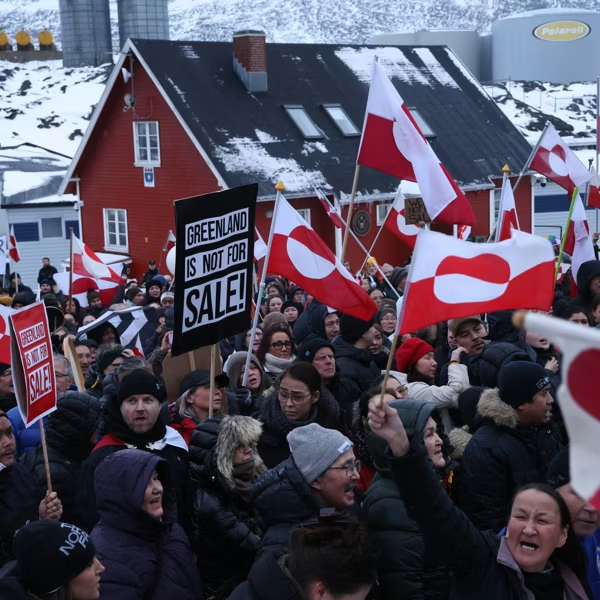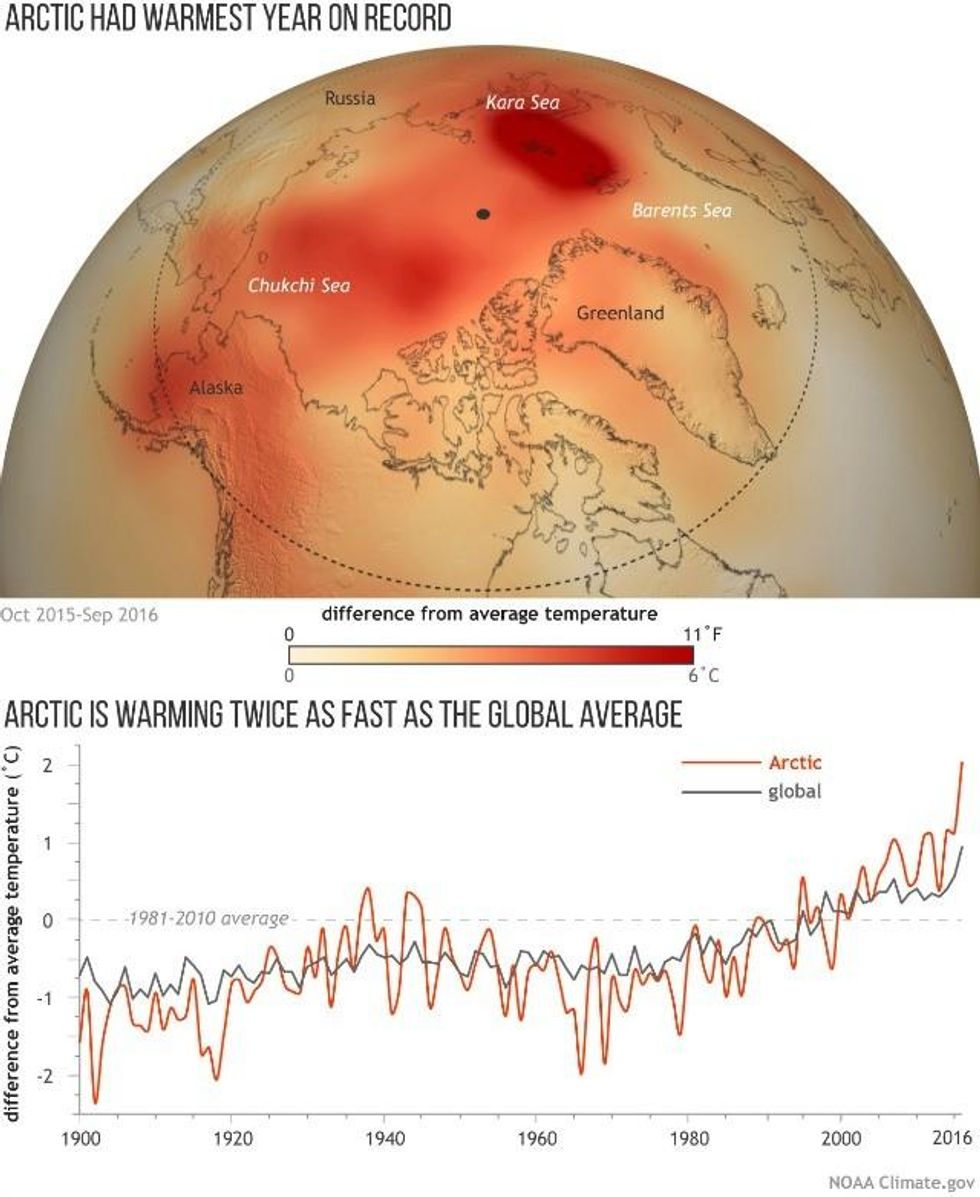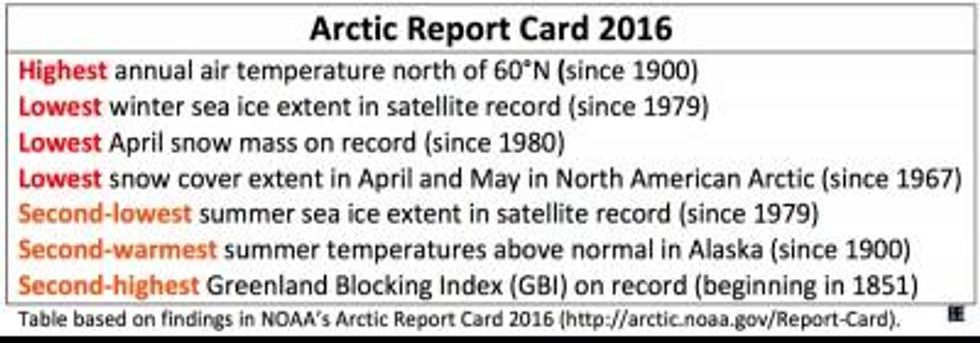If President-elect Donald Trump's appointments of a "band of climate conspiracy theorists" weren't already stoking fears for the ever-warming planet, the latest Arctic Report Card from the National Oceanic and Atmospheric Administration (NOAA) may well provide the ignition.
The annual assessment, released Wednesday, finds that "persistent warming" is driving "extensive changes" to the region. In fact, the average air temperatures were "unprecendented"--the highest on observational record--and "Arctic temperatures continue to increase at double the rate of the global temperature increase," NOAA states.
"Rarely have we seen the Arctic show a clearer, stronger, or more pronounced signal of persistent warming and its cascading effects on the environment than this year," said Jeremy Mathis, director of NOAA's Arctic Research Program. "While the science is becoming clearer, we need to improve and extend sustained observations of the Arctic that can inform sound decisions on environmental health and food security as well as emerging opportunities for commerce," he added.
The report's main findings, as noted by NOAA:
- Warmer air temperature: Average annual air temperature over land areas was the highest in the observational record, representing a 6.3 degree Fahrenheit (3.5 degree Celsius) increase since 1900. Arctic temperatures continue to increase at double the rate of the global temperature increase.
- Record low snow cover: Spring snow cover set a record low in the North American Arctic, where the May snow cover extent fell below 1.5 million square miles (4 million square kilometers) for the first time since satellite observations began in 1967.
- Smaller Greenland ice sheet: The Greenland ice sheet continued to lose mass in 2016, as it has since 2002 when satellite-based measurement began. The start of melting on the Greenland ice sheet was the second earliest in the 37-year record of observations, close to the record set in 2012.
- Record low sea ice: The Arctic sea ice minimum extent from mid-October 2016 to late November 2016 was the lowest since the satellite record began in 1979 and 28 percent less than the average for 1981-2010 in October. Arctic ice is thinning, with multi-year ice now comprising 22 percent of the ice cover as compared to 78 percent for the more fragile first-year ice. By comparison, multi-year ice made up 45 percent of ice cover in 1985.
- Above-average Arctic Ocean temperature: Sea surface temperature in August 2016 was 9 degrees Fahrenheit (5 degrees Celsius) above the average for 1982-2010 in the Barents and Chukchi seas and off the east and west coasts of Greenland.
- Arctic Ocean productivity: Springtime melting and retreating sea ice allowed for more sunlight to reach the upper layers of the ocean, stimulating widespread blooms of algae and other tiny marine plants which form the base of the marine food chain, another sign of the rapid changes occurring in a warming Arctic.
And this Arctic-specific data has repercussions far beyond the region.
"What happens in the Arctic doesn't stay in the Arctic," Mathis said to the Associated Press. "The lower 48 [states] may have to deal with more extreme weather events in the future."
The Independent adds:
Scientists who produced the annual Arctic Report Card warned the situation was changing so quickly it was "outpacing our ability to understand and explain" what they were witnessing.
They even suggested the word glacial could no longer be used to mean a slow pace and should be redefined to refer to something that was "rapidly diminishing."
According to Brenda Ekwurzel, a senior climate scientist and the director of climate science at the Union of Concerned Scientists, the "jaw-dropping" assessment from NOAA "is remarkable for two reasons."
First, so many records were broken or ranked second in each respective observational period (see Table). The second reason is that change is happening so fast and with such great magnitude that NOAA included an addendum to log changes leading up to the report release.
The report, said Margaret Williams, managing director for U.S. Arctic programs at World Wildlife Fund (WWF), is "a red flashing light."
Given that the Arctic changes are due to "our growing carbon emissions," the only choice now, she said, "is to turn away from fossil fuels and embrace clean energy solutions. Protecting the future of the top of the world requires us to reduce emissions all around it."
The new report was released at the American Geophysical Union meeting in San Francisco, outside of which scientists were protesting Trump's attack on climate science.
"We are at a moment in history where we have to do something," said Naomi Oreskes, a history of science professor at Harvard University, to SFGate.
"This is a frightening moment. We have seen how the reins of the federal government are being handed over to the fossil-fuel industry," she added.
To see more about the Arctic Report Card, watch this video uploaded to YouTube by NOAA:





